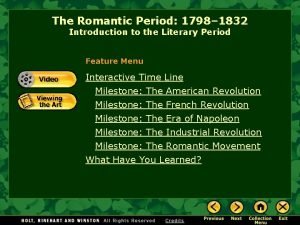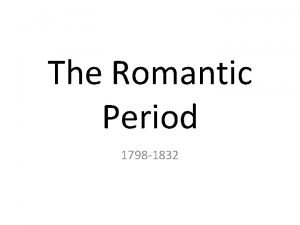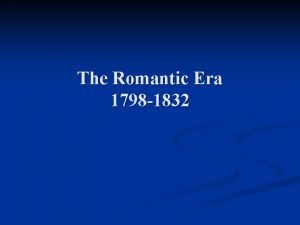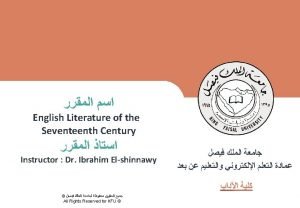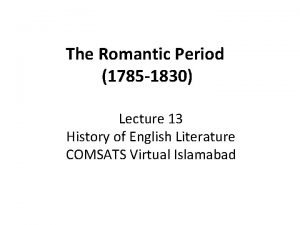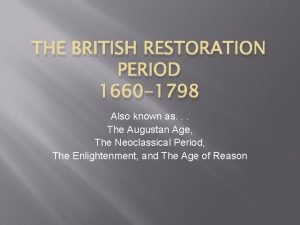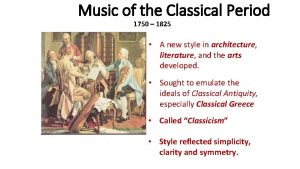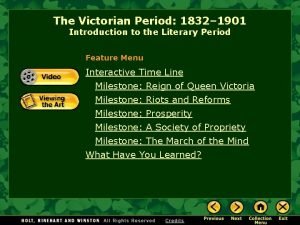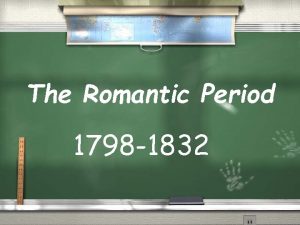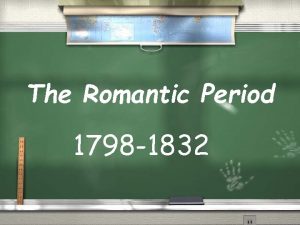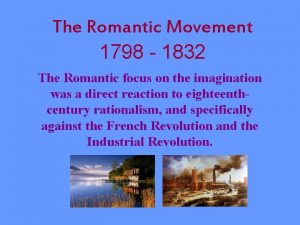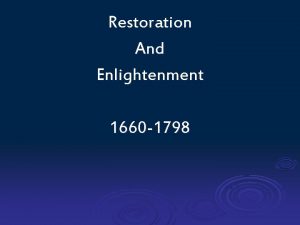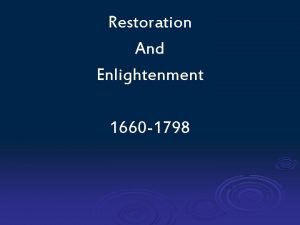The Romantic Period 1798 1832 Restoration 1660 1800











- Slides: 11

The Romantic Period 1798 -1832

Restoration (1660 -1800) • 1660 - Charles II assumes the throne to begin the Restoration • 1665 - More than 68, 000 Londoners die from the plague • 1666 - Great Fire of London destroys much of the city • 1687 - Sir Isaac Newton establishes his laws of gravity • 1689 -Glorious Revolution (no blood); James II is succeeded by a Protestant monarch (William and Mary) • 1695 - Laws established to deny Catholics of civil rights • 1707 - England, Scotland, and Whales are unified as Great Britain • 1754 - Seven Year’s War ends-Britain controls most of North America • 1775 - American Revolution • 1798 - Small Pox Vaccine

Rationalism vs. Romanticism Rationalism • Inspiration- logic, science, Classical Greek and Roman literature • Attitudes/Interestsscience, technology, exploration, tradition, elegance • Social Concerns- social hierarchy, stability and harmony, aristocracy Romanticism • Inspiration- feelings, emotions, imagination, Medieval literature • Attitudes/Interestsmysterious and supernatural, romanticized past, spontaneous, appreciated folk traditions • Social Concerns- favored democracy, concerned with common people

What’s Going on in England? • 1793 - France declares war on Britain • 1804 - Steam engine is used to drive a locomotive • 1811 - New Idea of Anatomy is publishedexploration of brain and nervous system • 1811 - Napoleon surrenders to Britain at Waterloo • 1825 - Railroad locomotive invented • 1829 - Catholics are allowed to hold public office • 1831 - Charles Darwin expedition • 1833 - Slavery is abolished in Britain

Revolution Spreads • Many social, economic, and political changes—marked by violence • Many people feared literature was based off imagination • This literature was called the Romantic Period – Turned to nature, the past, or a dream world

Romantic Poets William Wordsworth • Thought to be extraordinary people— vital to society • Poetry dominated during this time • Famous Poets- Keats, Wordsworth, Blake, and Shelley William Blake John Keats

Basic Characteristics • English Romanticism begins in 1798 with the publication of Wordsworth and Coleridge’s The Lyrical Ballads • Believed poetry could purify individual souls and society. • Focused their writings on inner feelings, emotions, & imagination

• Three Main Influences: – Political Rebellion – Rustic Life – Personal Feelings • Tried to provide a model for a better way of life. • Three distinguishing qualities: – Turned away from reason and embraced imagination – Writings spoke of personal experience and emotions – Nature transformed them. Nature and human mind mirrored each other.

Romantic Authors • The novel was still popular • Jane Austen, Sir Walter Scott, and Maria Edgeworth were influential

Industrialization • England was the first to undergo industrialization • Factories were popular urban populations increased poor living conditions • Farms taken over by owners unemployed farmers migrated to the cities • Laissez Faire- “let people do as they please” – Rich got richer

Industrialization and Literature • Britain was adrift and frightened – The response- eerie and supernatural literature • Gothic writing – Helped express the helpless feelings – Used ghosts, death, violence, eerie settings – Purge fears through literature
 1798-1832
1798-1832 Romantic period 1798 to 1832
Romantic period 1798 to 1832 The romantic period 1798 to 1832
The romantic period 1798 to 1832 The romantic period 1798 to 1832 summary
The romantic period 1798 to 1832 summary Romantic period 1798 to 1832
Romantic period 1798 to 1832 The puritan age
The puritan age The romantic period 1785 to 1832
The romantic period 1785 to 1832 The romantic age (1798 to 1824)
The romantic age (1798 to 1824) 1660 time period
1660 time period Music of classical period 1750 to 1820
Music of classical period 1750 to 1820 Victorian age 1832 to 1901
Victorian age 1832 to 1901 Victorian period
Victorian period
